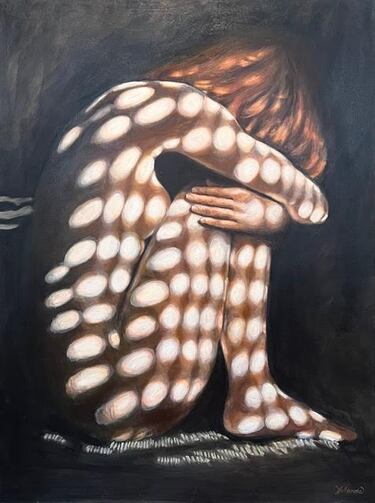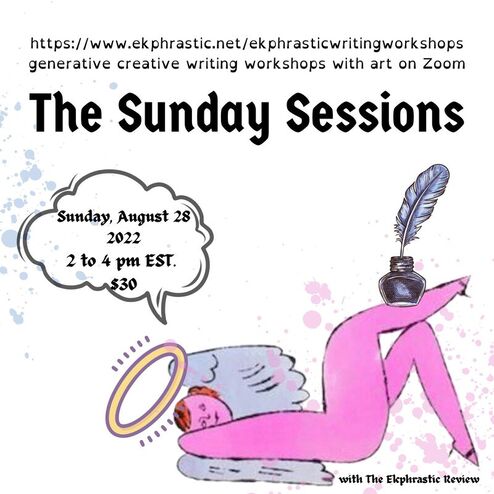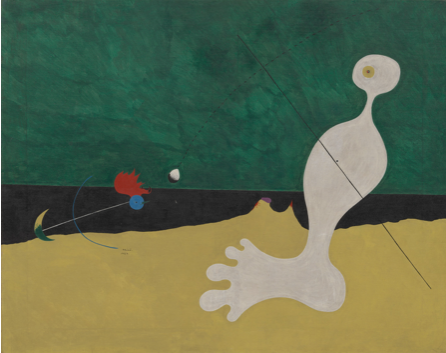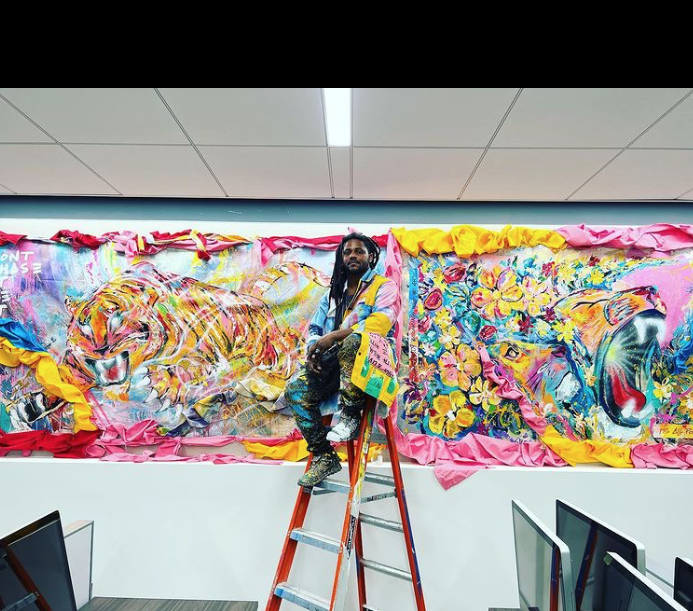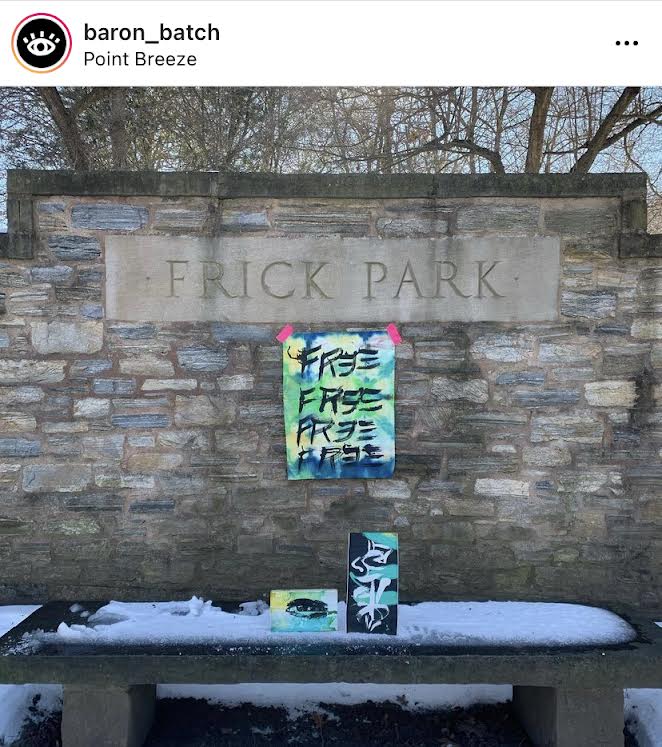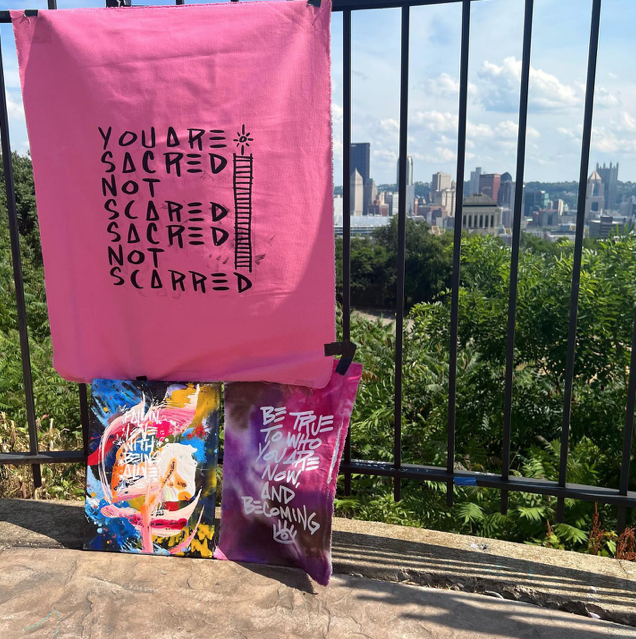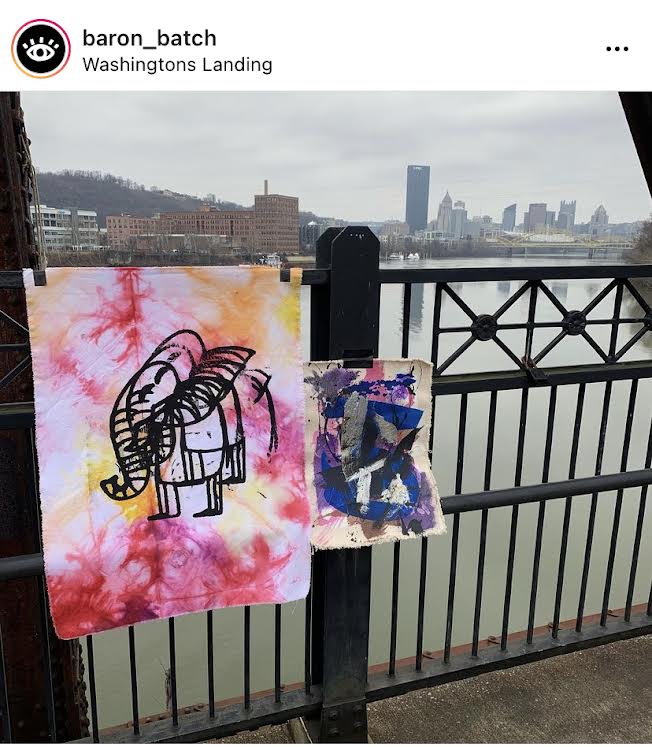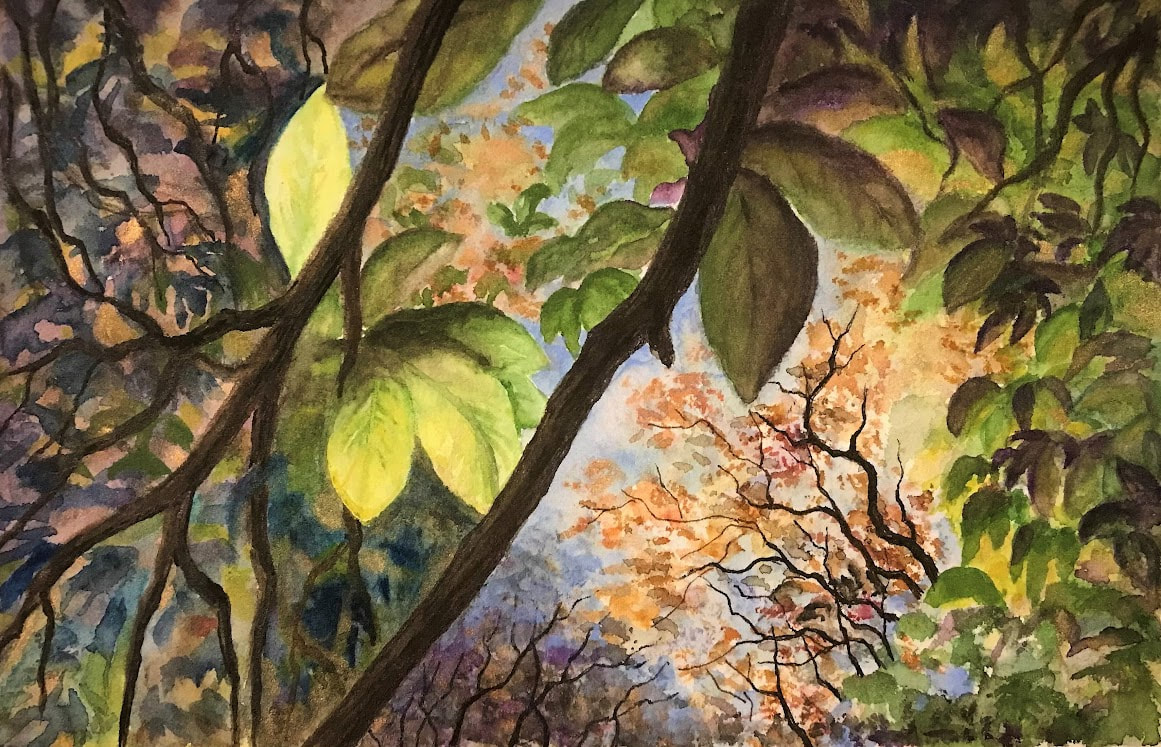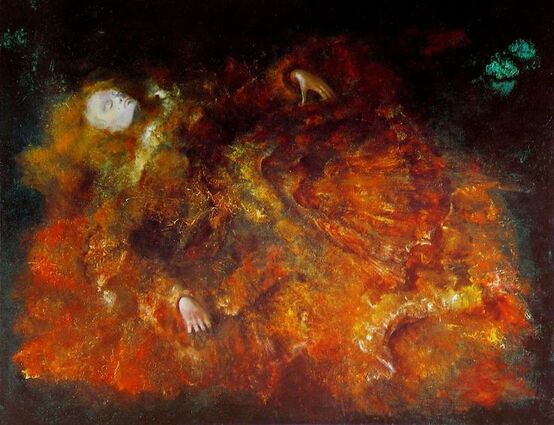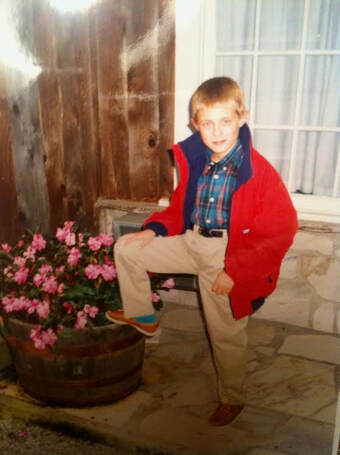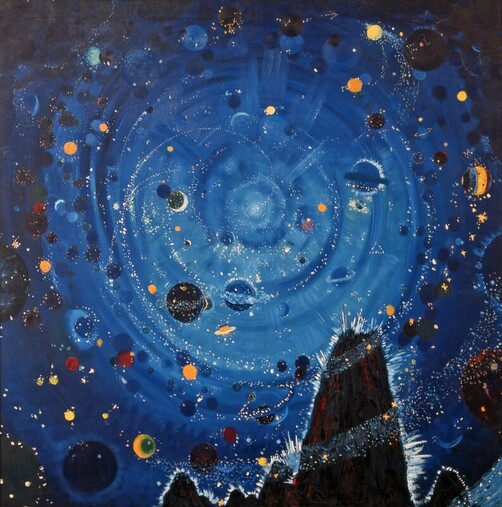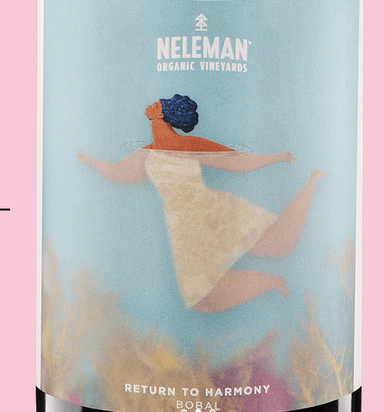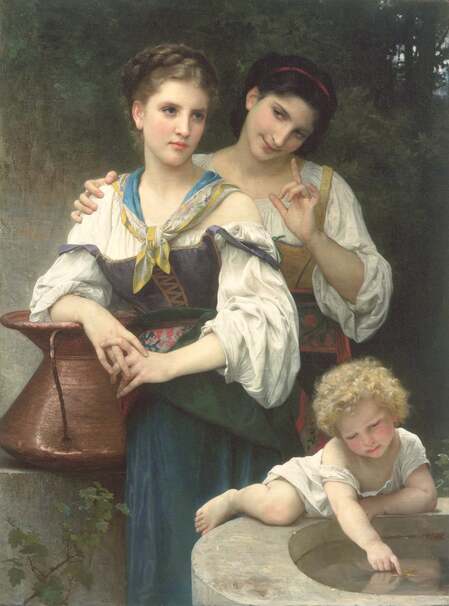|
Peril Unknown The woman in custody folds into a shadow, flames of hair fall lethargic. Glacial light zeros in, her back riddled with eyes that accuse without mercy. What is she guilty of, huddled with bent limbs like a spotted fawn in the sights of a gun? Already you condemn her with your curiosity. Does she silence herself to a marriage she deserves, or so believes, when he opens fire every chance he gets? By now her spine porous. Or is she detained at the Mexican border behind a chain link mistrust, the floodlights of liberty flickering endless circles of interrogation? Make what you will of her peril. But note the softened edge, colour that bleeds into shadow, brings warmth to the space in between light and dark, pleading clemency. Diana Cole Diana Cole, a Pushcart Prize nominee, has had poems published in numerous journals including Poetry East, Spillway, The Tar River Review, Cider Press Review, The Public’s Radio 89.3, Friends Journal, Verse Daily, Tipton Poetry Journal, The New Verse News and most recently in The Main Street Rag and Crab Creek Review. Her chapbook, Songs by Heart was published in 2018 by Iris Press. She is an editor for The Crosswinds Poetry Journal and a member of Ocean State Poets whose mission is to encourage the reading, writing and sharing of poetry.
1 Comment
Join us this coming Sunday afternoon for our ekphrastic Sunday Session.
The Sunday Sessions are single event zoom workshops where we get together to explore art and write. In these sessions, we explore and discuss four or five different paintings, and do writing exercises from the themes and imagery in the artworks. These sessions are informative, fun, and creative. We connect through conversation, writing, and optional sharing of the sparks we produce. Other upcoming workshops include a session on Joseph Cornell, and on the witch in art history. Check them out here. All are welcome! These workshops are a great fit for both experienced writers and new ones, because we use different approaches to inspire a variety of responses. Poetry, fiction and prose writers welcome. Some writers leave with new drafts, new blueprints, or simply with new sparks and ideas. The Invention of Catch A man threw a stone at a bird, and the bird threw it back, and the man threw it back at the bird, and the bird threw it back at the man, and the man once again threw the stone at the bird, and the bird once again threw the stone at the man, and the man threw it back, and the bird threw it back, and the man and the bird threw the stone back and forth. Peter Cherches This story is from the author's book, Whistler's Mother's Son (Pelekinesis, 2020). Peter Cherches’ most recent book is Masks: Stories from a Pandemic. Called “one of the innovators of the short short story” by Publishers Weekly, he’s also a jazz singer and lyricist. He’s a native of Brooklyn, New York. FREE for Baron Batch 1. Tell me about your art, Baron. Tell me about the way the frenetic, ecstatic colour leaves the pallet and moves through you like a ribbon curling out of your finger tips or a scarf spiraling from a magician’s sleeve —lime to yellow to turquoise to fuchsia. Baron! Can you hear me? 2. Tell me about the canvas unstretched, unstitched, thin-- FREE as a summer cricket playing it’s wings’ violin in the wind-- can you imagine? An instrument in your body? 3. You said you like to warm up with elephants, you are comfortable in elephants. They are your love language. You’ve found a home in them, and I think there’s something to these untethered creatures lumbering out of your canvases ready to greet each outstretched hand with a trumpet of colour. And not trumpet like Miles, but trumpet like Kermit. High every night! of the week! making beautiful! music in the thick! New Orleans heat! 4. Baron! Once upon a time, they pulled you away, angry for the art you were making in public places, printing words like “graffiti,” like it was a bad thing. The bad kind of art, Baron. Not the kind deep behind museum walls and mandatory donation boxes placed prominently next to gift shops and cafes where you can buy Monet’s for $50 on a coffee mug or a glossy poster ($200 if it’s framed). 5. Baron, they charged you. Fined you. Tried to tie your hands up behind you. But you shifted. You twisted. You pushed up against it– and started making art anew. 6. You even made art with the officer who arrested you. Invited this man into your painter’s home and asked him to create. Did you see something good in him, Baron? Some unsung something? Something beautiful but quiet? Something under the thick flak jacket? 7. Dear Baron, tell me about the gentle souls you see and seek. Are you driven to goodness like some men are driven to madness? 8. Now with tape you hang your boundless pieces beloved elephants, expansive skylines, giraffes stately and playful, even a beloved bounty hunter, all over the city with the word FREE because you are, Baron. 9. And, Baron, I think that FREE might be a tip of the cap to the law, who couldn’t hold you back. But. But. I think more than that, well, I think it’s a sign to us, as we clamber for your canvases in a surreal scavenger hunt around this beautiful city —that you don’t do this for the money and the money doesn’t do it for you. Amanda James Amanda James is a graduate of the University of Pittsburgh Writing Program. She lives in Pennsylvania with her husband and son. Discover more about Baron Batch and his work here. 停顿 长路中这短暂的停顿 林子深处有细碎的响动 松鼠正在为冬天储食 麋鹿抬起头 目光穿越树林交错攀延的影子 蜘蛛在静谧中编织 它的琴弦被空气的暗流拨动 暗影环抱我们 深沉,温柔: 两片依偎的叶子 被光的子弹击中 ** Pause A pause in a long walk Rustling came from deep woods: Squirrels were hiding food for the winter A deer raised her head gazing into interlacing branches A spider weaved in silence Hidden currents in air plucked the strings of his Mandolin Shadows are holding us Heavily, gently: Two leaves leaning on each other were penetrated by a bullet of light Sha Huang Sha Huang grew up in China and received her PhD degree in the University of Iowa. Her poems appeared in many literary journals and anthologies in China, the U.S, and Europe, including The Ekphrastic Review, The Wild Word, Muddy Review Poetry Review, and Chinese and Western Poetry (中西诗歌). Her poems were nominated for Pushcart Prize and Best of the Net in 2021. In addition to writing poems, she also enjoys creating art. Her water color works were exhibited in Suzhou, China, Asheville, North Carolina, and Acworth and Kennesaw, Georgia. She currently teaches Chinese and Asian cultures at Kennesaw State University. When a Woman Reaches Supernova Pressure-squeezed into the tiny space the world allows the weight of labels crushing from all sides her nuclear core burns a new pressure builds resists the gravity of expectation her fury consumes her fuel too quickly tips the balance of that gravity and her fire until she collapses her surface reaches event horizon time stands still gravity’s influence eclipses her completely not even light can escape. Gabby Gilliam Gabby Gilliam lives in the DC metro area. Her poetry has most recently appeared in Tofu Ink, The Ekphrastic Review, Cauldron Anthology, Instant Noodles, MacQueen’s Quinterly, and three anthologies from Mythos Poets Society. You can find her online at gabbygilliam.squarespace.com or on Facebook at www.facebook.com/GabbyGilliamAuthor. Dane's Note: These poems for Throwback Thursday were selected due to my admiration for the talent of their authors as well as my fondness or appreciation for the source art. I've been revisiting the journal's archives lately as I make final edits to my manuscript of ekphrastic poems (due to be published by Main Street Rag), trying to maintain my excitement for ekphrasis and to understand how my book fits into this literary tradition. I'm thankful that two poems from the manuscript first found a home at The Ekphrastic Review. ** Conversation with an Eye Seen Through the Keyhole, by Jim Davis Jim Davis brings us a wildly imaginative interpretation of Lorette C. Luzajic's abstract painting. Despite the fact that it's Jim's mind making the wild connections, we're still able to recognize so much more in the painting through the poetry: "Rubber ducks bob in censoring suds / Do you think I can fit inside the shower / caddy?" https://www.ekphrastic.net/ekphrastic/conversation-with-an-eye-seen-through-the-keyhole-by-jim-davis ** White Doors, by Robbi Nester I'm a sucker for paintings of doors and windows for some reason. Robbie Nestor's take on Vilhelm Hammershoi's haunting painting gets right at the core of what's so strange about the piece: "a book of lives standing on edge, eternally / ajar in the dusty back room of the afterlife." https://www.ekphrastic.net/ekphrastic/white-doors-by-robbi-nester ** Memories Suspended by Filaments, by Ruth Bavetta Joseph Cornell's art provides wonderful sources of poetic inspiration since each of his artworks are catalogs in their own right. Ruth Bavetta's poem is interesting because it mostly catalogs the man and his method of creating before finally ending on a description of the specific piece: "Oh, / Bebe Marie, you are so beautiful, / pale pink, hidden among silvery wings." https://www.ekphrastic.net/ekphrastic/memories-suspended-by-filaments-by-ruth-bavetta ** Poems after John James Audubon, by Colin Morris I have a great appreciation and a soft spot for Audubon's ornithological paintings. Colin Morris's series of poems drew me in right away with their creative and individual approaches to describing each painting: "Lemon-carmine throats / tremor, wings pulse / shutter green." https://www.ekphrastic.net/ekphrastic/poems-after-john-james-audubon-by-colin-morris ** Magritte, by Bill Yarrow Magritte is another artist whose work is a great subject for writing ekphrasis. Bill Yarrow's poem both tackles and achieves the weirdness of Magritte's surrealist art while also providing a strange and engrossing half-narrative, half-dream: "Now the tendon of God is stretched to plain view. / A million onions have been carried to the mirror." https://www.ekphrastic.net/ekphrastic/magritte-by-bill-yarrow ** What Remains, by Melanie Figg I interned at the Minneapolis Institute of Art just over 15 years ago, so I'm amused by Melanie Figg's choice to write about this posthumous mourning portrait (as she notes, the painting's subject is rumoured to haunt the museum). Figg's prose poem is interesting because although its narrator seems to be the dead boy, it also examines our modern perception of this strange painting practice: "I thought death would be a place where no one saw me anymore. But I am everywhere, everywhere." https://www.ekphrastic.net/ekphrastic/what-remains-by-melanie-figg ** Cezanne's Tears, by David Leeds Cezanne's art is recognizable for most museum-goers. What really pulls me into David Leeds's poem is his refutation of the imaginative for the scientific, which emphasizes the spectacle of realness and provides the analogy for the pull of the apples: "It is like Cezanne's apples. / How he traded the sweetness of the flesh / for the cold force inside..." https://www.ekphrastic.net/ekphrastic/cezannes-tears-by-david-leeds ** Dane Hamann is a Chicagoland editor and poet. He is the current poet in residence for derailleur.net, a newsletter/website devoted to professional cycling. His book A Thistle Stuck in the Throat of the Sun (Kelsay Books, 2021) is ostensibly about running. His second book, Parsing the Echoes, a collection of ekphrastic poems, is forthcoming from Main Street Rag Publishing Company. Read Dane's ekphrastic poem, Grain, here. Read Dane's ekphrastic poem, Field, here. Nocturne With thanks to those who saw and captured the magic Before, when the sun slipped away coruscating wonder and wisdom reigned above; Hablik looked up to find earth grasping for a whirling, scintillant firmament; Van Gogh beheld intense, shimmering spirals of power surmounting a sleepy town; now, city-bound, I am greeted by a murky veil harkening to Whistler’s night visions, but bleached of his delicate beauty. Abscond, throw off time’s shackles, escape blinding excess; gaze skyward anew, rediscover the painful, lost art of patient, faithful waiting. […] Dusk settles over pastorality, crickets serenade dancing fireflies, a dog a farm or two over bids farewell to the sinking crescent moon and, channeling Sappho, welcome to the glittering diamond signifying Venus. Jupiter, lord of the planets, is soon shepherded in, followed by the Martian mote cloaked in dusky red. The first stars, Dickinson’s Arcturus and Auden’s Vega, sparkling across unfathomable expanses lead a trickle, then a flood filling the sky with pointillist wildfire slashed through by the Milky Way’s blazing river of embers. […] […] Breathe […] […] All too quickly modernity searches me out, recouples the fetters, and ushers me back under the cataractic dome, back to my pseudo-cave where I will hibernate and remember, and dream of a return. Jennifer Wenn This poem was previously published in Beliveau Review 6. Jennifer Wenn is a trans-identified writer and speaker from London, Ontario. Her first poetry chapbook, A Song of Milestones, has been published by Harmonia Press (an imprint of Beliveau Books). She has also written From Adversity to Accomplishment, a family and social history; and published poetry in WordCity Literary Journal, The Ekphrastic Review, The Stratford Quarterly, Beliveau Review, Journey of the Heart, Watchyourhead, Open Minds Quarterly, Tuck Magazine, Synaeresis, Big Pond Rumours, Fresh Voices, Wordsfestzine, and the anthologies Dénouement and Things That Matter. She is also the proud parent of two adult children. Visit her website at https://jenniferwennpoet.wixsite.com/home In Search of Harmony I swim like a manatee, my curved and bountiful body perfect to float, wearing a cloth of sun that filters into muted hues of amber, magenta, cerulean - rainbow shades only seen in my waking world on days falling water prisms light. Coral, animal like me, anchored to the sea but mobile in feathered wings of welcome, underwater angels blessing life far above their reach. I’m bound too, to the rules of my species, careful to keep my head above the water, eyes on an earth where we’ve tossed our poisons into the sea, where our rising heat strands coral’s bleached bodies and our own, in a breathless breach of faith. Joanne Durham Joanne Durham is the author of To Drink from a Wider Bowl, winner of the 2021 Sinclair Poetry Prize (Evening Street Press, April 1, 2022). Her chapbook, On Shifting Shoals, is forthcoming from Kelsay Books. Her poetry appears in many journals. Please visit https://www.joannedurham.com/ for more about her background, publications, and awards. The Secret Her shoulder, soft and full as a swan’s breast, illumines homely features in graceful symmetry – ivory beauty with reticent eyes, adrift, and full, sealed lips. Behind – her sister, eclipsed by her honey-suckle aura, mutes a reprimand. On the garden fountain ledge, a child idly circles his finger in water, while her sister whispers - Father would be furious – but tell me, what was it like? Polly Giantonio This poem was first published at The Cafe Review. Polly Giantonio's poems and work have appeared in various journals, including an interview published in Poets & Writers. She has been a long-time student of Prem Rawat, Ambassador of Peace. Polly resides in rural Vermont, USA. |
The Ekphrastic Review
COOKIES/PRIVACY
This site uses cookies to deliver your best navigation experience this time and next. Continuing here means you consent to cookies. Thank you. Join us on Facebook:
July 2024
|
